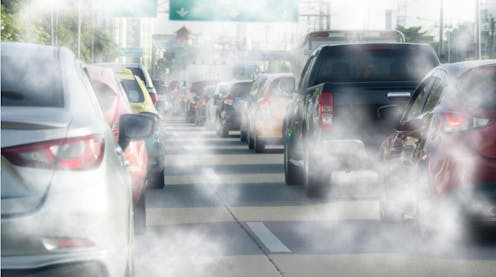Making fossil fuel companies accountable for their products’ emissions would support the clean energy transition
- Written by Fabiola Schneider, Assistant Professor, Dublin City University

I recently found myself among a group of alarmed scientists, writing a fervent plea to the European Commission[1] to be more ambitious when it comes to corporate greenhouse gas reporting requirements. Our open letter calling for comprehensive disclosure of corporations’ contribution to the climate crisis gathered support from over 100 fellow researchers around the world.
So, news from the COP28 global climate change conference this year that countries have agreed to “transition away from fossil fuels”[2] is welcome, although it’s far from the level of ambition needed.
One of the actions that could help properly address fossil fuel production is a much stronger stance from regulators on the fossil fuel sector’s scope 3 emissions[3], which arise from other parts of a company’s supply chain, and so are indirectly linked to a company’s activities. In particular, we need more transparency around a scope 3 category called “use of product” emissions – those that come from people using a company’s product after it’s sold.
This was also pointed out recently[4] by António Guterres, secretary general of the UN.
“On the one hand, the fossil fuel industry – the giant behind the climate crisis – is finally starting to wake up,” he said. “But the promises made clearly fall short of what is required … the announcement to achieve net zero by 2050 says nothing about eliminating emissions from fossil fuel consumption – the so-called Scope 3.”
Under the greenhouse gas protocol[5], the industry standard for accounting for corporate emissions, scope 3 emissions include “upstream” emissions, for example, goods and services bought by a company, but also “downstream” emissions such as those related to distribution or waste management.
Importantly, scope 3 also includes emissions from the use of products a company sells. This means it’s an excellent test of whether a business model will actually work in a net zero world.
Fossil fuels, by their nature, will always emit greenhouse gases when burned in a car or plane, or in gas-fired power plants. An oil firm may reduce direct emissions from its own operations (generally called scope 1 and scope 2) by putting solar panels on its refineries and improving its efficiency, but its use of product emissions is directly related to the amount of fossil fuels the firm sells, which generates the revenues the company depends on.
Research[6] I conducted with a fellow academic looked at emissions across 11 sectors. This paper, which is a preprint and so has not been through the peer-review process yet, shows that scope 3 emissions constitute an average of 86% of total emissions.
While there has been some progress[17] on addressing (upstream) supply chain emissions in company’s purchasing decisions, the downstream use of product emissions will be harder to tackle. You can’t buy your way out of an unsustainable business model – not that some fossil fuel firms don’t try.
Cheap carbon credits sold on the voluntary carbon offset market[18] are used to “offset” emissions from fossil fuels[19] that are then labelled and sold[20] as “carbon neutral” – but less than 5% of offsets actually remove carbon from the atmosphere[21].
That’s why it’s even more critical to require companies to disclose “gross” – the total without deducting offsets – rather than “net” emissions.
The EU missed the opportunity to introduce such emission reporting as part of mandatory disclosures under its Corporate Sustainability Reporting Directive, implemented via the European Sustainability Reporting Standards in July 2023. As a result, it risks falling behind on climate leadership.
Indeed, in California a law[22] was just passed mandating firms, including those privately held, to report on emissions (including scope 3 from 2027) if they operate in the state and have a minimum revenue of US$1 billion (£800 million). This will probably apply to big names like Apple and Chevron.
Read more: Exxon, Apple and other corporate giants will have to disclose all their emissions under California's new climate laws – that will have a global impact[23]
Accounting for scope 3 emissions encourages companies to consider their entire business model when it comes to meeting net zero goals. Merely outsourcing scope 1 or 2 emissions is not feasible; a comprehensive decarbonisation approach is needed.
This could significantly accelerate global decarbonisation efforts. But even more crucially, it would put the onus on corporations, which have been profiting from polluting for years. As a result, they not only have the means but also the ethical obligation to act.
References
- ^ plea to the European Commission (www.smurfitschool.ie)
- ^ “transition away from fossil fuels” (www.reuters.com)
- ^ scope 3 emissions (ghgprotocol.org)
- ^ pointed out recently (www.un.org)
- ^ greenhouse gas protocol (ghgprotocol.org)
- ^ Research (papers.ssrn.com)
- ^ Hoepner & Schneider (papers.ssrn.com)
- ^ CC BY-NC-ND (creativecommons.org)
- ^ 540 million metric tons CO₂-equivalent (Mt CO₂e) (corporate.exxonmobil.com)
- ^ more than (edgar.jrc.ec.europa.eu)
- ^ often argued (www.reuters.com)
- ^ doesn’t control (www.linkedin.com)
- ^ revolving credit line (www.eni.com)
- ^ do not report sufficiently (clarity.ai)
- ^ research shows (doi.org)
- ^ iSOMBOON/Shutterstock (www.shutterstock.com)
- ^ some progress (www.wemeanbusinesscoalition.org)
- ^ voluntary carbon offset market (www.bloomberg.com)
- ^ “offset” emissions from fossil fuels (www.reuters.com)
- ^ labelled and sold (www.bnnbloomberg.ca)
- ^ remove carbon from the atmosphere (www.bloomberg.com)
- ^ a law (www.theguardian.com)
- ^ Exxon, Apple and other corporate giants will have to disclose all their emissions under California's new climate laws – that will have a global impact (theconversation.com)







